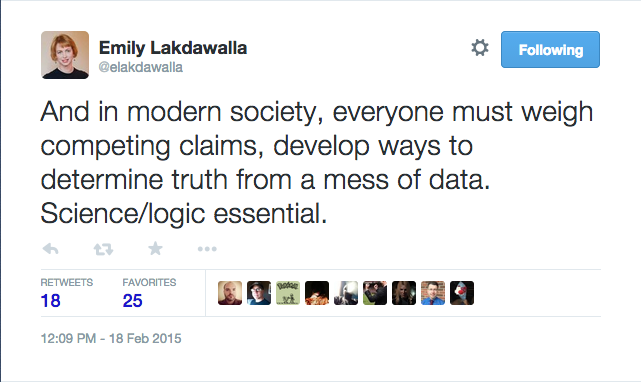“But I’m a journalist, I don’t do math.” It’s a phrase you’re bound to hear at least once a day in the halls of a journalism school, and one I’m afraid I’ve even uttered a few times. Head down the street a few buildings, though, and you’ll find yourself in the physics department, surrounding by equations and intricate graphs. If you stick around long enough (especially if they know you’re a journalist) you’ll hear things like, “I’m not a writer” and, “I hate talking to people. I’m just an awkward scientist.”
While these things are generally said in passing and meant to be funny, the mindset that because you’re one thing you can’t be another is an increasingly common and scary phenomenon. A column in The Washington Post makes a great argument for why we need more STEM graduates to have a background in the liberal arts. She’s right, but I think it needs to go the other way as well. We need more science literate liberal arts students.
Emily Lakdawalla, a planetary scientist, writer and public speaker shared the same sentiment in a series of tweets referencing the article.
As a undergraduate, I was required to take two sections of a science course and two lab classes. Like most of my peers, I chose Geology 101, 102, 103 and 104. We affectionately referred to these classes as “rocks for jocks.” It was fairly easy, especially compared to chemistry and biology courses meant to weed out the weak, but it was equally as important of a class, if not more, especially for living and working in Appalachia.
Appalachia’s economy, politics, history, geography and livelihood rely on the materials we can pull from the earth. While my GEO 101 course taught me the intricacies behind the making of coal, it failed to tell me why I should care. I learned about what a water table was, but it didn’t tell me how hydraulic fracturing could endanger it, or what happens when it dries up.
As it turns out, though, physicists, journalists, geologists, historians, engineers and athletes all need energy and water, and therefore must recognize the need for science and art and learn how to effectively utilize the collision of the two. Educators at all levels, elementary through college, must tackle this problem head-on. You don’t have to absolutely love every academic field out there, and it’s ok to be better at one over another, but students have to recognize how important literacy on all levels really is.
What’s your college degree or area of employment? How did classes outside of that area affect you? Tweet at me or comment below to join in on the conversation.


